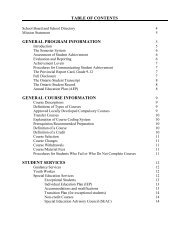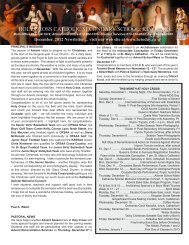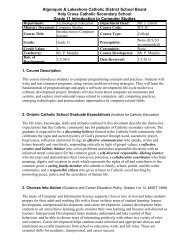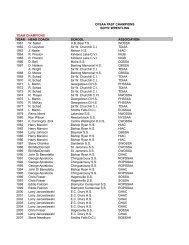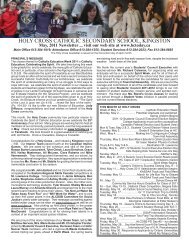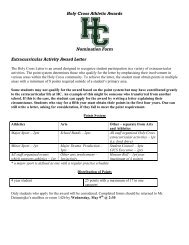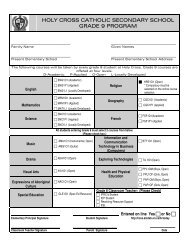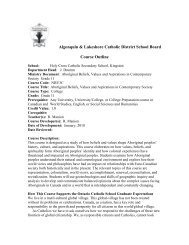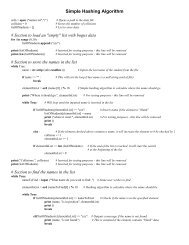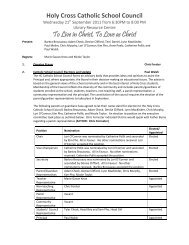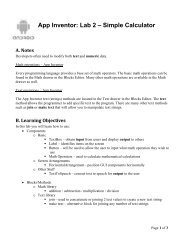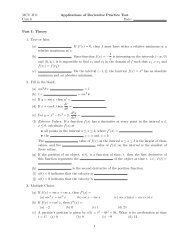GPP 3O Course Outline
GPP 3O Course Outline
GPP 3O Course Outline
Create successful ePaper yourself
Turn your PDF publications into a flip-book with our unique Google optimized e-Paper software.
Algonquin & Lakeshore Catholic District School Board<br />
Holy Cross Catholic Secondary School<br />
Department: Guidance & Career Education<br />
Ministry Document:The Ontario<br />
Curriculum Grades 11 and 12 – Guidance &<br />
Career Education<br />
<strong>Course</strong> Title: Leadership and Peer Support<br />
Grade: 11<br />
Credit Value: 1.0<br />
Teacher(s): Pat Murphy<br />
Date of Development: September 2010<br />
<strong>Course</strong> Description<br />
<strong>Course</strong> <strong>Outline</strong><br />
<strong>GPP</strong> 30<br />
Peer Tutoring<br />
Department Head: Ana Cantarutti<br />
<strong>Course</strong> Code: <strong>GPP</strong> <strong>3O</strong><br />
<strong>Course</strong> Type: Open<br />
Prerequisite: None<br />
Corequisite: None<br />
<strong>Course</strong> Developer(s): Guidance<br />
Department<br />
Date Reviewed: February 2011<br />
This course prepares students to act in leadership and peer support roles. They will develop skills in<br />
communication, interpersonal relations, teamwork, and conflict management; and apply those skills in leadership<br />
and/or peer support roles. Students will examine group dynamics and learn the value of diversity within groups and<br />
communities.<br />
Tutors need to have 80% of above in the subject area in which they wish to work.<br />
Tutors are often placed in high needs classrooms. There may be a lot of tutees in the classroom and/or the tutees<br />
may require a lot of academic support. Tutors tend to be placed first in high needs areas and next in areas of lesser<br />
need. Tutors in core subjects such as English, Mathematics, Science, English-as-a-Second Language, Geography,<br />
and Religion are often in high demand. Based on their interests, strengths and the needs of others, students will be<br />
placed in a classroom in order to serve as a role model and leader in the class.<br />
Ontario Catholic Graduate Expectations<br />
The life roles, knowledge, skills and attitudes outlined in this document describe the distinctive expectations that the<br />
Catholic community has for graduates of Catholic secondary schools. The graduate is expected to be; a discerning<br />
believer formed in the Catholic Faith community who celebrates the signs and sacred mystery of God=s presence<br />
through word, sacrament, prayer, forgiveness, reflection and moral living; an effective communicator who speaks,<br />
writes and listens honestly and sensitively, responding critically in light of gospel values; a reflective, creative and<br />
holistic thinker who solves problems and makes responsible decisions with an informed moral conscience for the<br />
common good; a self-directed, responsible, lifelong learner who develops and demonstrates their God-given<br />
potential; a collaborative contributor who finds meaning, dignity and vocation in work which represents the rights of<br />
all and contributes to the common good; a caring family member who attends to family, school, parish, and the wider<br />
community; and a responsible citizen who gives witness to Catholic social teaching by promoting peace, justice and<br />
the sacredness of human life.
Choices Into Action<br />
The study of Leadership and Peer Support supports Choices Into Action and helps students prepare for their adult and<br />
working life with a focus on three areas of student learning: learner development, interpersonal development, and<br />
career development. Learner development helps students to set and achieve learning goals, monitor their own<br />
learning and become self-directed as learners. Interpersonal Development helps students understand and take control<br />
of their behaviour, and be able to choose ways of interacting positively with others in a variety of roles and contexts.<br />
Career development helps students make informed and appropriate choices and implement successful transitions from<br />
school to education, work, and life roles. These are essential skills for academic, interpersonal, and career success.<br />
Strands and <strong>Course</strong> Expectations (The Ministry of Education, The Ontario Curriculum, Guidance<br />
and Career Education, Grades 11 and 12)<br />
A. Personal Knowledge and Management Skills<br />
OVERALL EXPECTATIONS<br />
By the end of this course, students will:<br />
• explain how their personal characteristics and acquired skills may affect their interactions with others in<br />
leadership and peer support roles;<br />
• identify the characteristics of an effective leader and use these to evaluate their own leadership and peer support<br />
capabilities;<br />
• identify and apply the personal-management skills and characteristics required to succeed in leadership and peer<br />
support roles;<br />
• identify and apply effective teaching and learning strategies and resources to help others through leadership and<br />
peer support roles.<br />
B. Interpersonal Knowledge and Skills<br />
OVERALL EXPECTATIONS<br />
By the end of this course, students will:<br />
• use strategies that promote positive interpersonal relationships as they pertain to leadership and/or peer support;<br />
• demonstrate effective use of communication skills in a variety of settings;<br />
• apply theories related to group dynamics and leadership in various situations;<br />
• explain how community dynamics affect leadership and peer support roles.
C. Exploration of Opportunities<br />
OVERALL EXPECTATIONS<br />
By the end of this course, students will:<br />
• describe, on the basis of research, the range of leadership and peer support opportunities in the school and the<br />
community, and identify those to which they are most suited;<br />
• demonstrate the ability to design and implement a plan or program that addresses needs identified in the school<br />
or the community;<br />
• identify a range of careers and postsecondary options requiring skills in leadership and peer support.<br />
Learning Skills (Administrative Procedures, Secondary School Policy for Assessment, Evaluation, Grading and<br />
Reporting, Grades 9-12, ALCDSB September, 2006)<br />
An important key to success in this course is a positive attitude toward learning and to the investigative nature of the study of<br />
Leadership and Peer Support. Maximum use of class time is crucial to obtain the support of the teacher and peers.<br />
Homework will be the continuation of work begun in class and should be completed to obtain the practice and reinforcement<br />
needed to succeed on summative evaluations.<br />
Student learning skills will be assessed and recorded separately from achievement of curriculum expectations on their report<br />
card (using a four-point scale: E-Excellent, G-Good, S-Satisfactory, N-Needs Improvement) in the following areas:<br />
* Responsibility (task commitment, behaviour, goal setting)<br />
* Organization (goal setting, prioritize tasks)<br />
* Independent Work (time management, materials management, self advocates)<br />
* Collaboration (listens attentively, gets along with others, group contribution)<br />
* Initiative (attempts new ativities, extends thinking)<br />
* Self-Regulation (problem solving, risk-taking, self-direction, self-awareness, approach)<br />
Accommodations<br />
Whenever accommodations are made to address student learning needs, or alternative or modified expectations are<br />
identified for a student, these accommodations, modifications, or alternative expectations will be outlined in an<br />
Individual Education Plan (IEP) and will be communicated to parents. Selections from the following may be considered<br />
for use:<br />
* provide photocopies * set up a study plan with the student<br />
* give extra time on a given task * highlight key points on print materials<br />
* provide one-on-one instruction * model a variety of test-taking strategies<br />
* pair the student with a study buddy * use simple language and directions<br />
* provide a quiet place to work * provide organizational tools
Assessment and Evaluation (Administrative Procedures, Secondary School Policy for Assessment,<br />
Evaluation, Grading and Reporting, Grades 9-12, ALCDSB September, 2006)<br />
Assessment practices will be aligned with curriculum expectations and will incorporate a variety of appropriate and<br />
authentic assessment methods, strategies, and instruments. The Achievement Chart for Guidance and Career Education<br />
will be used to provide a reference point for all assessment practice, including the assignment of percentage grades.<br />
Students will be assessed and evaluated based on their achievement of the specific course learning expectations. Student<br />
achievement of the overall expectations will be evaluated in a balanced manner among the four learning categories,<br />
knowledge and understanding, thinking, communication, and application as outlined the document AAdministrative<br />
Procedures@ (p.4 section 1.4)<br />
<strong>Course</strong> Work Evaluation<br />
70% of the grade will be based on term work evaluations conducted throughout the course. This portion will reflect the<br />
student=s most consistent & recent level of achievement.<br />
Summative Evaluation<br />
30% of the grade will be based on a final evaluation in the form of a summative assessment activity.<br />
Due Dates (Note that this policy is presently being reviewed)<br />
A due date is set providing the students with adequate time to complete the evaluation piece. Work not submitted on the<br />
due date will be considered late and will be penalized as follows:<br />
- 1 school day late will be penalized 5% or half of a level<br />
- 2 to4 school days late will be penalized 10% or up to 1 level<br />
This provides the students with 5 school days to submit the work or 1 calendar week.<br />
If the work is not submitted in these 5 school days then 1 of the following will occur :<br />
a) The student completes the work under teacher supervision during lunch hour, with the Student Success teacher, or<br />
in Study Hall during that week<br />
b) The student agrees to complete, within one week - 5 school days, an alternative evaluation piece set by the<br />
teacher.<br />
c) A phone call is made between the teacher and the parent (if student is under 18) where it is discussed that neither<br />
option A or B is satisfactory to the student and that a zero will be assigned for the work. Furthermore, this zero<br />
will have an impact on their final grade. This ensures that all partners are involved in monitoring academic<br />
progress.<br />
Assessment & Evaluation Strategies<br />
An appropriate selection of assessment strategies will be used which will allow evaluation of student achievement of the<br />
curriculum expectations. Selections from the following list of assessment and evaluation tools may be used:<br />
* checklists * learning skills track sheet<br />
* rubrics / achievement charts * weekly log/journal entries<br />
* formative projects * summative culminating project / activity<br />
Teaching / Learning Strategies<br />
A variety of instructional methods and strategies will be used which will facilitate student learning. Selections from the<br />
following list of teaching / learning strategies may be used:<br />
* lectures * demonstrations<br />
* audio / visual presentations * learning centres<br />
* field trips * guest speakers<br />
* student-centred activities * individual & team approaches<br />
* student exemplars * internet based research<br />
* spreadsheets
Learning Resources<br />
Note that there is no textbook available for this course. Students will complete weekly logs and journals developed<br />
by the Guidance Department.<br />
Board, School, Department and Classroom Policies<br />
The following policies apply to this course:<br />
* Administrative Procedures. October 2005. Secondary School Policy for Assessment, Evaluation, Grading and<br />
Reporting, Grades 9-12, 2005-2006.<br />
* Holy Cross Catholic Secondary School. September 2006. Student Code of Conduct & Behaviour. Student<br />
Handbook, 2006-2007.<br />
* Rules and Regulations Governing Shop Safety. September 2006. Holy Cross Catholic Secondary School,<br />
Technological Education Department.



